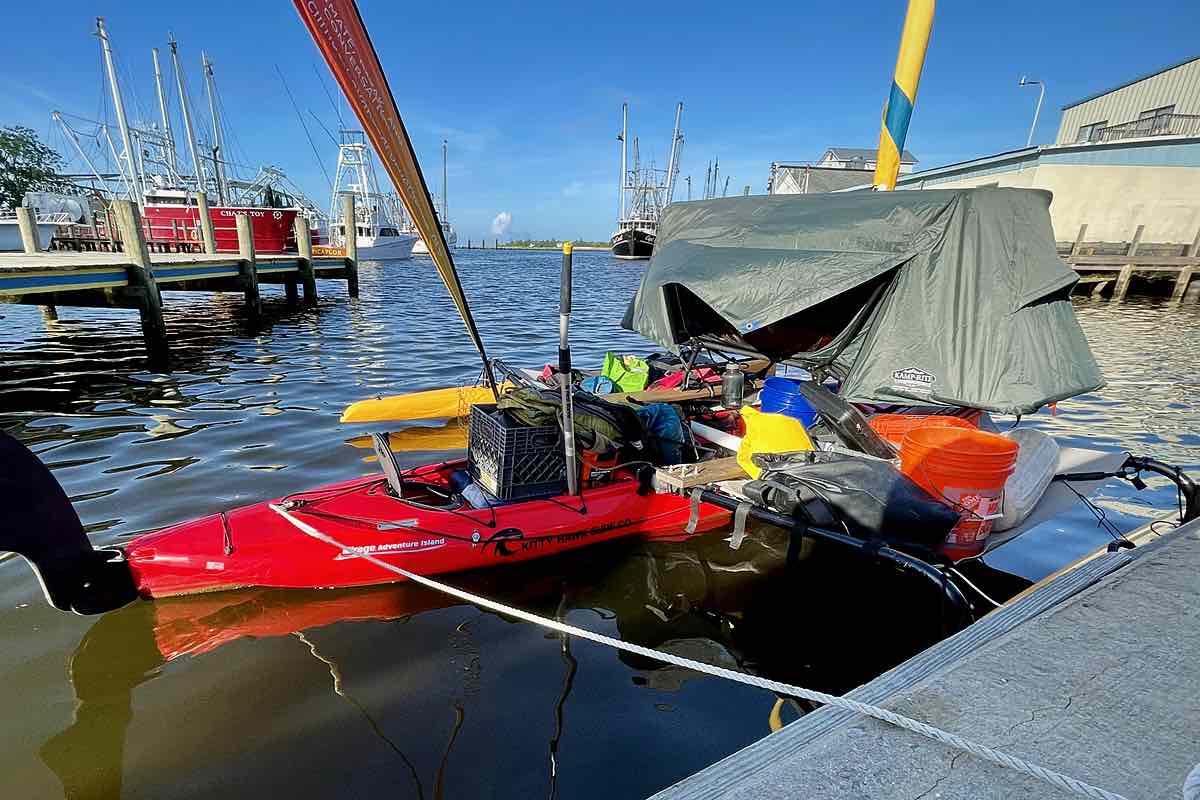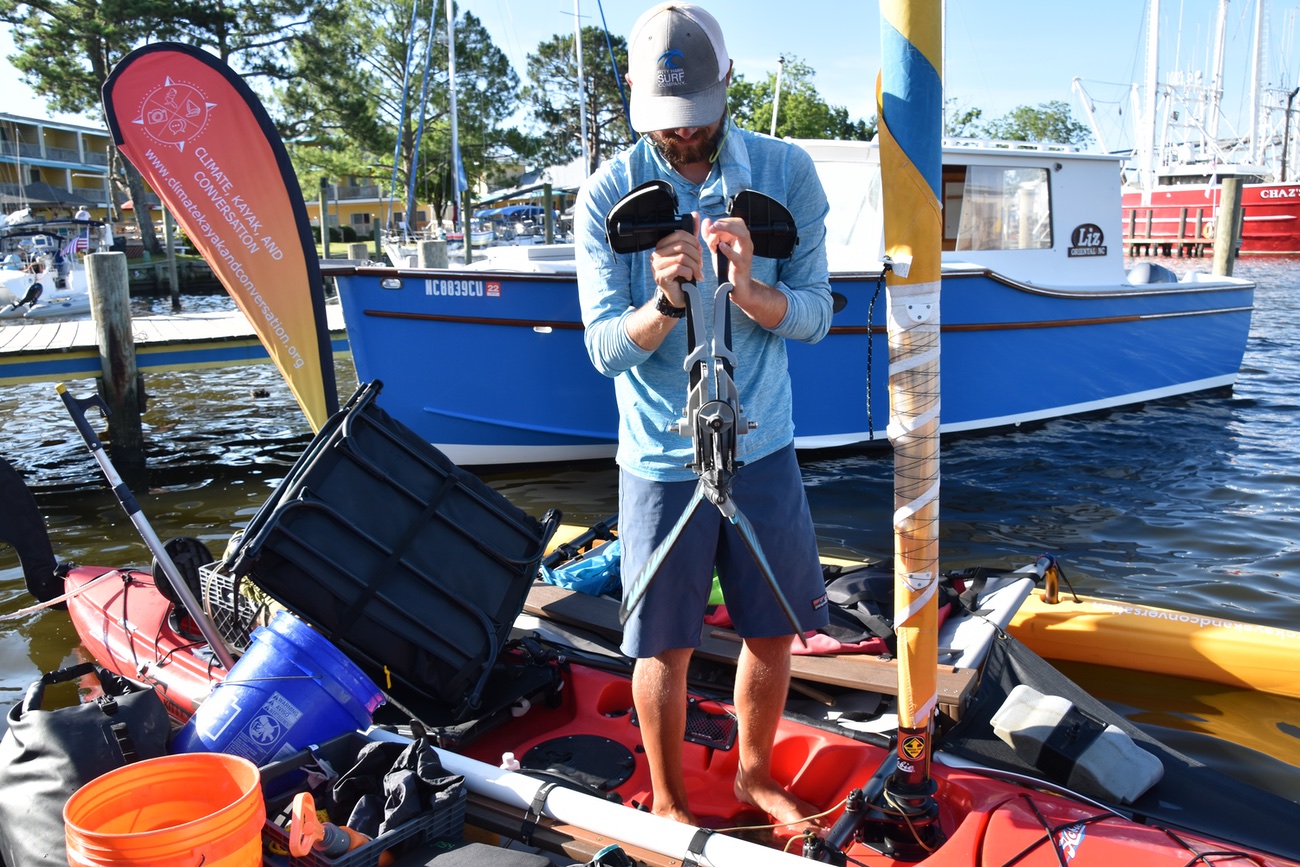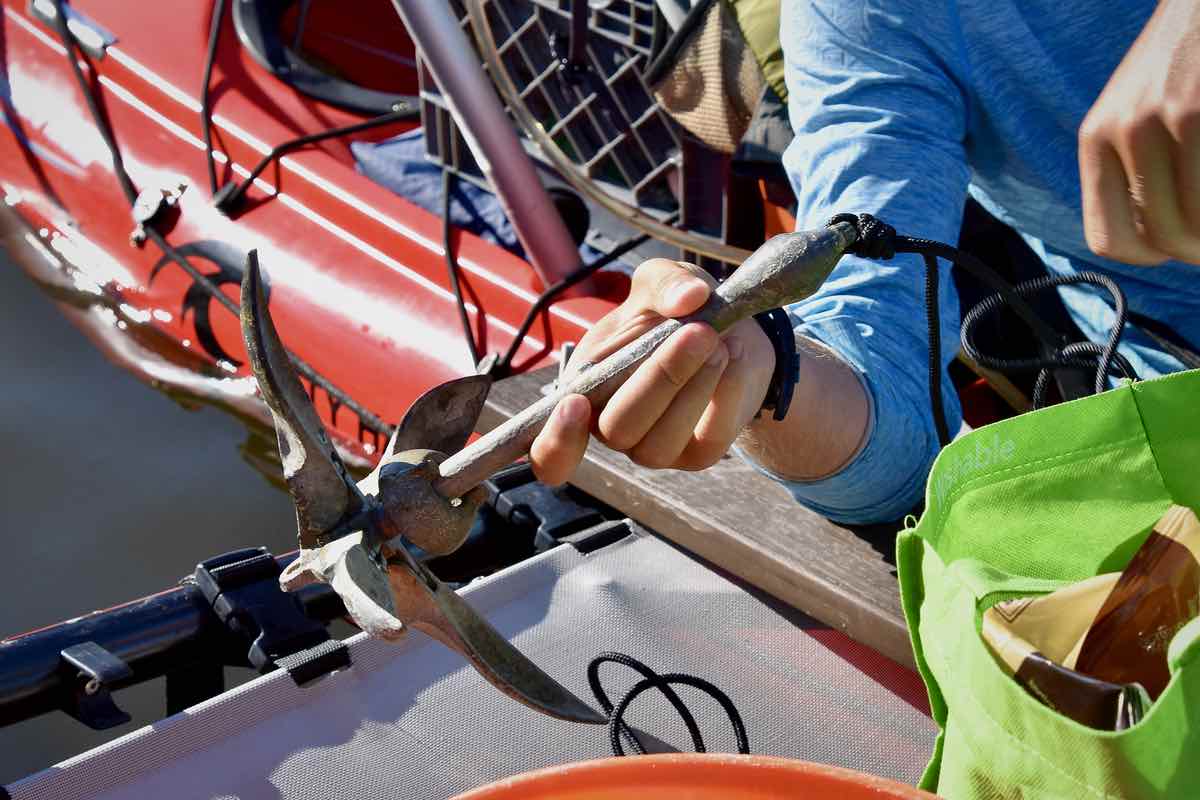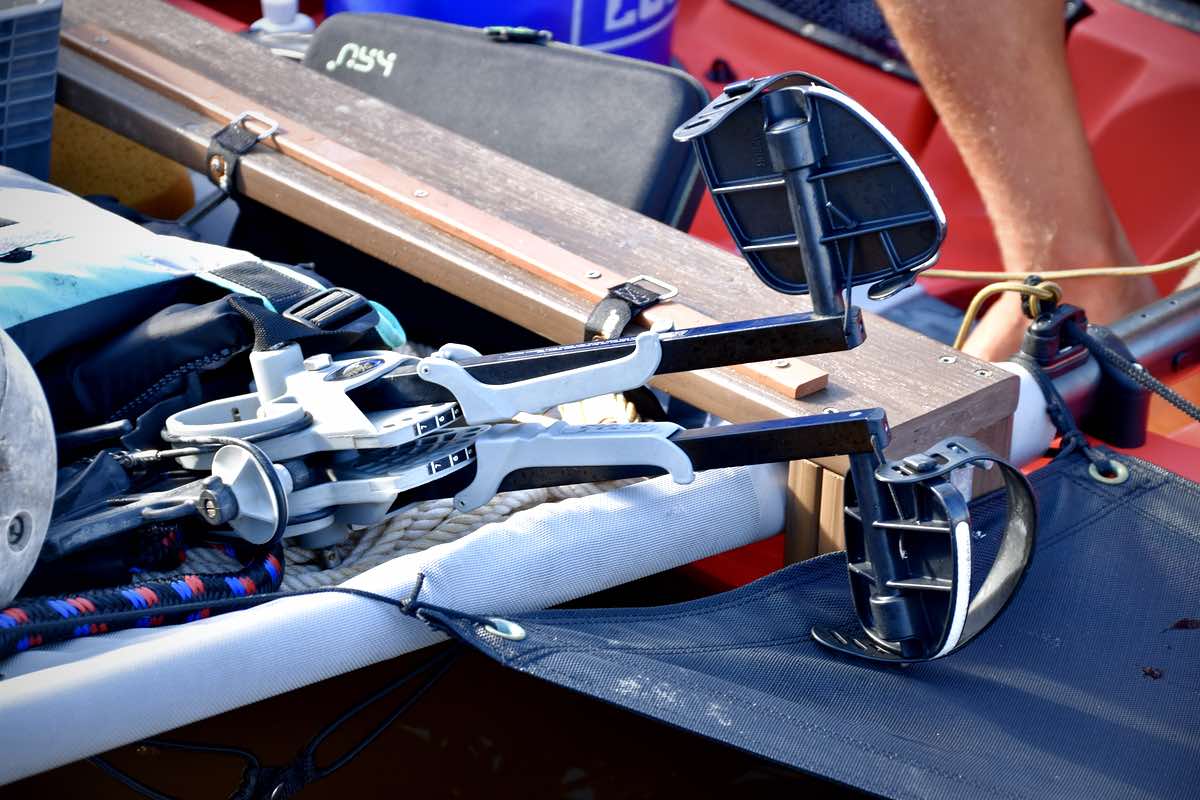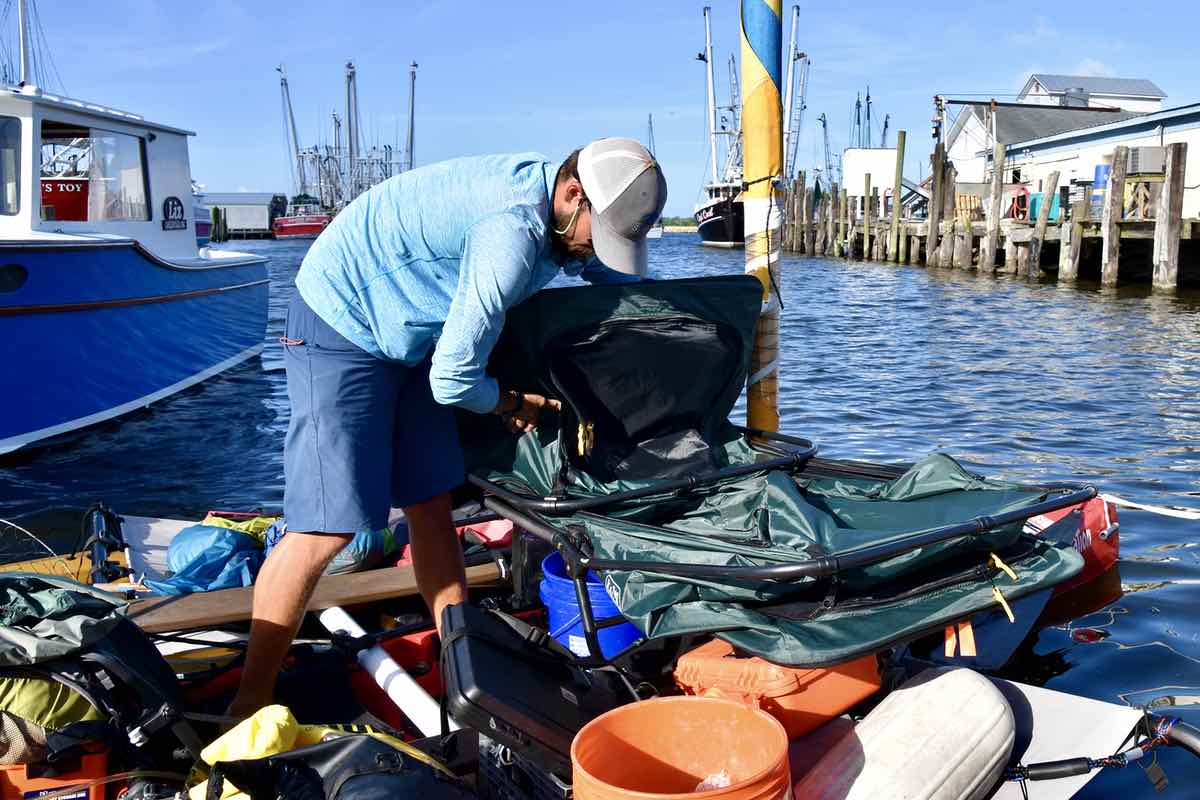It's Sunday February 15, 2026

Lots of boats come to Oriental, some tie up at the Town Dock for a night or two, others drop anchor in the harbor for a while. If you've spent any time on the water you know that every boat has a story. The Shipping News on TownDock.net brings you the stories of the boats that have visited recently.
December 1, 2021
Apop-up tent. Set up on a 16 foot sailing trimaran. Tied off to the bulkhead at near the town dock this summer. The solo crew is Will Freund, an educator with a background in science, a budding documentarian, and a man on a mission.
Will Freund.Will started his journey in Miami, sailing – and pedaling – his way up the Intracoastal Waterway to Norfolk, VA. Along the way, he stopped in towns and coastal communities to grab a coffee and start up a conversation. A very specific conversation. All about the weather and water changes experienced in coastal communities.
Will is on a mission. He wants to document the conversations, ideas, and experiences of people in coastal communities experiencing climate change, and use those experiences to promote environmental conservation and change.
Will and his one-man, kayak top tent.The idea came to him while taking a boating safety course in Sarasota. “The idea for the trip itself started as a daydream,” he said. “I was interning with the Marine Laboratory and Aquarium down in Sarasota.” He began with an idea to make the trip on the Intracoastal Waterway, eventually narrowing it down to just the east coast up to Virginia.
But Will wanted the trip to have a greater purpose. “With my background in science and education, I wanted to make the trip about something more than myself, something bigger. That’s where I had the idea for trying to understand climate change and coastal communities.”
It was his first big solo trip, which was one reason he narrowed the focus. He also didn’t have all the equipment he needed for such a journey, so Will reached out to sponsors to help support his mission. It’s how he was able to afford the 2015 Hobie Adventure Island sailing trimaran (with pedal power), and much of the other gear he needed.
Not something you see every day: a cot on a kayak.Beginning in March in Miami, one of his first conversations was with an environmental advocacy group called The Cleo Institute. What started as a conversation about climate change became a discussion about climate gentrification – how higher land away from the water was beginning to rise in price as the formerly desirable coastal properties flooded with every storm.
It was what Will had hoped to find: a story about the changes facing individual coastal communities.
From there, Will traveled north up the coast. Not only did Will have much to learn about coastal dwellers’ perception and ideas on climate change; he found he also had a lot to learn about navigating the wind and water, and facing challenges on his own.
The pedal system that failed. One of the pedal blades broke in the middle of Port Royal Sound.On the way to Beaufort, South Carolina, crossing Port Royal Sound, one of Will’s pedals broke. He’d timed the tide wrong, the wind was on his nose, and he was in two to three foot swells. “I was two miles from either shore and I was like, ‘well, we’re here. We just got to go.’ And I had my moment of absolute frustration,” he said. “‘Things are going really bad, but it won’t help with me being mad about it right now, because that’s only gonna create more problems.’ So I just buckled down and sailed the rest of the way.”
He eventually made it to his destination, but also allowed there were several times he wanted to turn around – or just rely on diesel dinosaur power to get him to his next destination. “There definitely have been moments where I’ve wanted, I just want to put a motor on it. I want a motor, but you know, that’s cheating.”
Essential gear – anchors and propulsion.Will made it to Oriental by early June, determined to continue on, collecting his conversations along the way. Many were with those who were not involved in climate activism.
“I was with a sailor in a marina here in North Carolina, and they didn’t necessarily work in the climate movement. They worked in corporate work, but they had a sailboat,” Will said. “So we started to drill down into the things that climate change affects.”
Of that conversation, as well others, Will said “almost everyone I’ve met is on board with ‘We don’t want water to inundate our cities. We don’t want plastic in our water. We don’t want hotter summers where we can’t live. We don’t want droughts where we can’t grow our plants.’ So when we were ended up talking to that, we are all very much on the same page. We all don’t want any of that. But where the breakdown happens then is correlating that to humans accelerating climate change.”
Will can fit a lot on a trimaran. Given he spent months on the water, it’s a good skill to have.And it’s the words themselves that Will says is part of the problem. “Just hearing the concept of climate change by itself […] implies to some people that there was a time climate wasn’t changing.”
Using different phrasing or words doesn’t work, he says, but changing the understanding and the education about it might. “I’m trying to take what I’ve learned back to the education community and be like, ‘Look, this is something we need to focus on, because the implications that scientists are proposing are drastic. But we can’t act on that if we’re not all on the same page as a country.’”
When asked how to get everyone on the same page, Will freely admits that he doesn’t know. “Where I’m trying to really start that is not by using facts, but by starting a conversation,” he said. “People that have completely pushed away science, they still care about their communities. They still care about their families. You can’t approach them with frustration and anger because they’re immediately going to push back on you.”
Will’s sleeping quarters are put up every night and taken down every morning.Will’s approach boils down to exactly what he’s doing: “reach out and just start a conversation.” He does not expect to change minds over night, or even in a year. “This one trip might not change anybody’s minds, but I hope that at least starts to have people start asking the questions we’re talking about.”
And Will has reached out in several ways: in person along his journey, with speaking engagements, and via social media and a web presence. To help do that, Will films his journey while commenting about environmental issues like plastics in the water, coastal flooding, or the impact on the wildlife he encounters.

For Will, this isn’t a one-and-done trip. He’s posted several short videos of his travels to YouTube, along with videos of presentations and conferences where he has presented his work.
“The ultimate peak of the end of this trip is a documentary that I’m putting together.”
Will departs, destination north.Related Links• Climatekayakandconversation.org
• Climate, Kayak, And Conversation YouTube Channel
Story & photos by Allison DeWeese.


